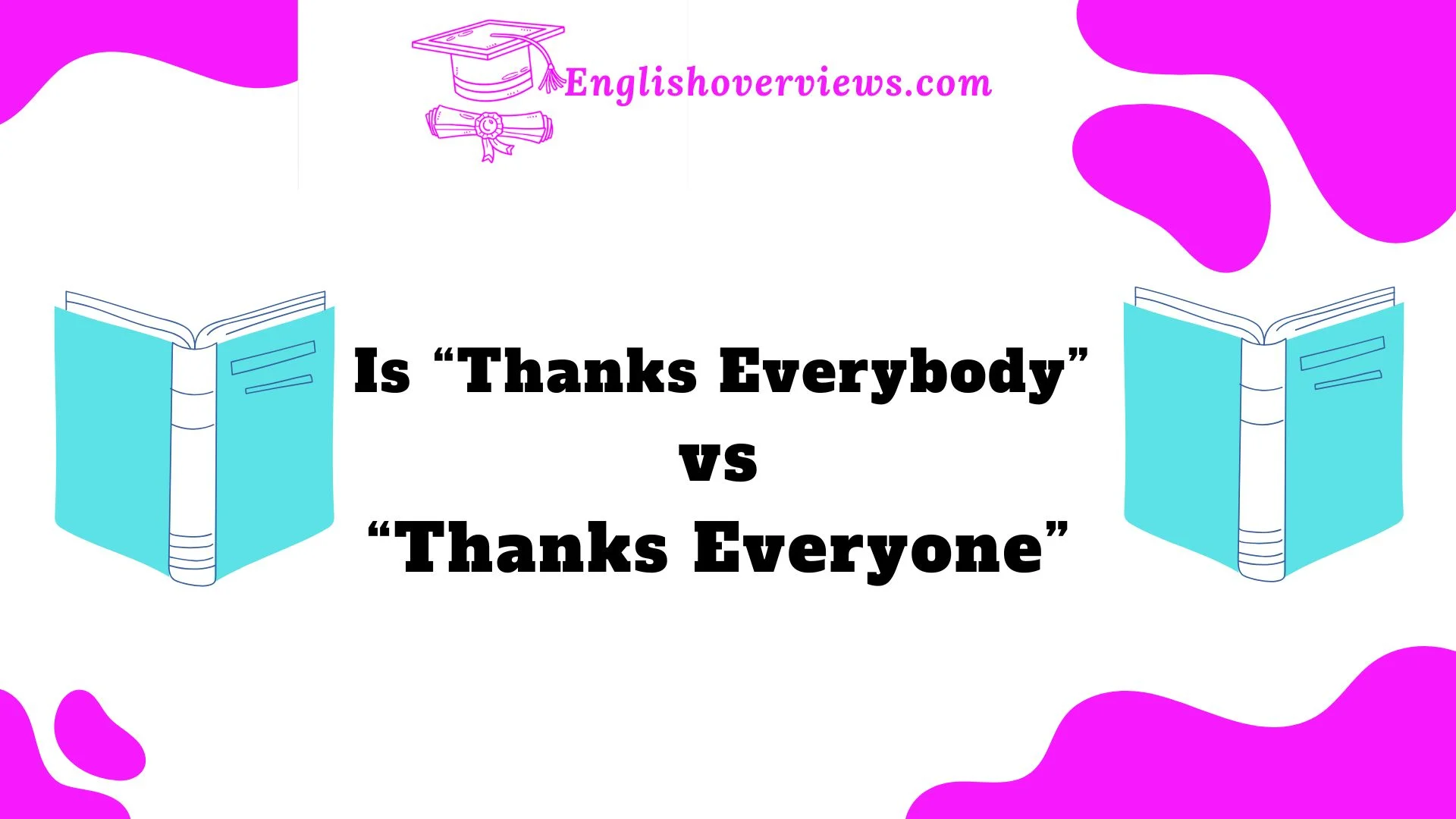Expressing gratitude is one of the simplest yet most meaningful ways to connect with others. Whether you’re addressing a group after a meeting, thanking a crowd at an event, or simply showing appreciation, the words we use matter. One common question that arises is: Is it better to say “Thanks Everybody” or “Thanks Everyone”?
At first glance, both phrases might seem interchangeable, but a closer look reveals subtle differences. In this post, we’ll dive deep into the nuances of these two expressions, explore their grammatical roots, and offer insights into when and where to use them.
By the end, you’ll know exactly how to express your gratitude in a way that feels appropriate, respectful, and effective for any situation.
Understanding the Nuances of ‘Thanks Everybody’ and ‘Thanks Everyone’
What’s the Difference Between ‘Everybody’ and ‘Everyone’?
Before we dive into the real question of which phrase to use, let’s first explore the difference between “everybody” and “everyone.”
In essence, both words mean the same thing. They refer to a collective group of people, and both are pronouns used to express inclusivity. However, there are subtle grammatical distinctions:
| Term | Usage | Example |
| Everybody | Often used informally in speech | “Everybody’s here for the meeting.” |
| Everyone | Slightly more formal, used in both spoken and written contexts | “Everyone was happy with the results.” |
- “Everybody” is casual and tends to be used in more informal contexts, especially in conversation.
- “Everyone” is neutral in formality and works in both formal and informal settings.
Why Do Both Expressions Sound Similar?
You might be wondering, “If they mean the same thing, why do we need two different words?” The simple answer is variety in language. While both are grammatically correct, the use of one over the other depends on the tone you want to convey.
When choosing between “Thanks Everybody” and “Thanks Everyone,” you’re deciding not only on word choice but also on the tone of your gratitude. And that’s where the fun begins!
The Formality Spectrum: When to Use Each Expression
One of the primary differences between “Thanks Everybody” and “Thanks Everyone” comes down to formality. Let’s take a closer look at how formality influences our language choices.
Casual Settings: When ‘Thanks Everybody’ Works Best
In casual settings, such as with friends, family, or close colleagues, “Thanks Everybody” feels natural and friendly. Imagine wrapping up a casual dinner party or a small team meeting — here, “Thanks Everybody” fits the tone perfectly. It’s warm, informal, and shows appreciation without any pretense.
Examples of when to use “Thanks Everybody”:
- Casual team meetings: “Thanks everybody for your input today!”
- Friend gatherings: “I appreciate it, thanks everybody for being here tonight.”
- Family events: “Thanks everybody for coming over to celebrate.”
Neutral Formality: When ‘Thanks Everyone’ Is More Suitable
On the other hand, “Thanks Everyone” works well in neutral settings where you want to strike a balance between casual and formal. It’s neither too stiff nor too relaxed, making it perfect for a variety of occasions. Whether you’re speaking at a semi-formal event or addressing a mixed group of colleagues and acquaintances, “Thanks Everyone” does the job.
Examples of when to use “Thanks Everyone”:
- Professional gatherings: “Thanks everyone for attending today’s workshop.”
- Community events: “Thanks everyone for your contributions to the fundraiser.”
- Public speeches: “Thanks everyone for your time and attention.”
Assessing the Level of Formality in Different Settings
Casual Settings: Informal and Friendly Gratitude
In informal situations, we aim for warmth and approachability. Using “Thanks Everybody” can add a touch of familiarity and friendliness, making people feel at ease. You’ll often hear this phrase in family settings, house parties, or even small team meetings.
However, it’s important to remember that using “Thanks Everybody” can sometimes be perceived as overly relaxed in more formal professional contexts.
Professional and Formal Settings: Respectful and Neutral Gratitude
In formal settings, neutral expressions like “Thanks Everyone” help convey professionalism without sounding too stiff or distant. You’ll see this phrase often at corporate meetings, conferences, or seminars, where you need to maintain a polite but warm tone.
When speaking at large public events, such as award ceremonies or public speeches, “Thanks Everyone” maintains a respectful distance while still showing gratitude to the audience.
Making the Right Choice for Professional and Casual Occasions
Tips for Choosing Between “Thanks Everybody” and “Thanks Everyone”
Choosing between these two expressions depends on the setting, your relationship with the audience, and the tone you want to set. Here’s a quick guide:
- Use “Thanks Everybody” when addressing:
- Small groups of friends or close colleagues
- Casual settings like informal meetups or family dinners
- Situations where a friendly, warm tone is preferred
- Use “Thanks Everyone” when addressing:
- Larger, more formal groups
- Semi-formal or mixed audiences
- Professional settings, conferences, or corporate events
Grammatical Insights: Exploring ‘Everybody’ vs. ‘Everyone’
Are ‘Everybody’ and ‘Everyone’ Grammatically Different?
In terms of grammar, “Everybody” and “Everyone” are synonyms. There is no significant difference in meaning, but there are slight distinctions in formality and sentence structure.
- “Everybody”: Can feel more informal or colloquial, and is often found in spoken language.
- “Everyone”: Slightly more neutral and may feel more appropriate in written contexts.
Subject-Verb Agreement
Both “Everybody” and “Everyone” are singular pronouns, so they take singular verbs. For example:
- “Everybody is invited to the event.”
- “Everyone has contributed to the success.”
The Etiquette of Group Gratitude in American Culture
How Gratitude is Expressed in Group Settings
In American culture, expressions of gratitude, like “Thanks Everybody” and “Thanks Everyone,” are important social cues. They signal appreciation and foster a sense of community.
- In informal settings, “Thanks Everybody” shows a familiar and personal touch.
- In more formal settings, “Thanks Everyone” provides a sense of professionalism while still showing gratitude.
Expression of Thanks in Informal Gatherings
When it comes to informal settings, expressions like “Thanks Everybody” are perfect for creating a warm atmosphere. Imagine hosting a barbecue or game night with friends. A casual, heartfelt “Thanks Everybody” can make everyone feel included and appreciated.
Other informal alternatives to consider:
- “Thanks a ton!”
- “I really appreciate it, everyone.”
- “You all are awesome, thanks!”
Expressing Gratitude in Semi-Formal and Formal Events
Semi-Formal and Formal Settings
In semi-formal and formal events, such as business presentations, charity galas, or conference speeches, “Thanks Everyone” is your go-to phrase. It strikes a balance between being polite and warm without sounding too casual.
For instance:
- After a corporate meeting: “Thanks everyone for your valuable insights today.”
- In a wedding speech: “Thanks everyone for joining us on this special day.”
Variations and Alternatives to ‘Thanks Everybody’ and ‘Thanks Everyone’
Other Expressions of Gratitude
Sometimes, you might want to mix it up and try other ways to say “thank you” without losing the essence of your message. Here are some alternatives:
- “Thank you all”: A formal and inclusive expression.
- “Much appreciated”: Short and sincere.
- “I’m grateful to all”: A more formal option for serious occasions.
- “Thanks so much”: Slightly more emotional and informal.
Regional Variations
In different parts of the world, you might hear subtle variations of these phrases. In the U.S., “Thanks Everybody” is common in casual speech, but in the U.K., “Thanks Everyone” might be favored for a slightly more formal touch.
Conclusion
To wrap up, both “Thanks Everybody” and “Thanks Everyone” are grammatically correct, but they serve different purposes depending on the level of formality.
“Thanks Everybody” fits casual, friendly settings, while “Thanks Everyone” is better for neutral to formal contexts. Remember, the right choice depends on the tone you want to convey, the context in which you’re speaking, and your audience.
By understanding the nuances between these phrases, you can express your gratitude in a way that feels genuine, respectful, and appropriate. So next time you’re in a group, think carefully about which one fits best — your audience will appreciate it!
FAQs
1. Is “Thanks Everybody” grammatically incorrect?
No, “Thanks Everybody” is grammatically correct, but it is more informal and typically used in casual settings.
2. Can I use “Thanks Everyone” in an informal setting?
Yes, while “Thanks Everyone” is slightly more formal, it can still be used in informal settings when you want to keep the tone polite but not too casual.
3. Which is better for a professional speech: “Thanks Everybody” or “Thanks Everyone”?
“Thanks Everyone” is better for professional speeches, as it sounds more neutral and respectful.
4. Are there any other ways to say thank you to a group?
Yes! Alternatives include “Thank you all,” “I appreciate it,” or “Much appreciated.”

English Overviews is a resourceful website dedicated to providing valuable content related to grammar and vocabulary.Babar Naeem has made notable contributions, sharing insights on various subjects, including WordPress themes and plugins. The primary goal of the site is to help users improve their English language skills effectively.











